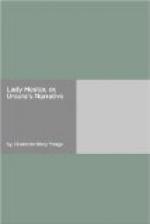However, they had gone to another resort of theirs, where there was a young hunter who often visited them, and was on friendly terms. When he found that there was a white woman living as a captive among them, he spared no effort to rescue her. Both he and she were often in exceeding danger; but he contrived her escape at last, and brought her through the woods to a place of safety, and there her child was born.
It was over the American frontier, and it was long before she could write to her husband. She never knew what became of her letter, but the hunter friend, Piers Dayman, showed her an American paper which mentioned Captain Trevor among the officers killed in their attack. Dayman was devoted to her, and insisted on marrying her, and bringing up her daughter as his own. I fancy she was a woman of gentle passive temper, and had been crushed and terrified by all she had gone through, so as to have little instinct left but that of clinging to the protector who had taken her up when she had lost everything else; and she married him. Nor did Hester guess till that very day that Piers Dayman was not her father!
There were other children, sons who have given themselves to hunting and trapping in the Hudson’s Bay Company’s territory; but Hester remained the only daughter, and they educated her well, sending her to a convent at Montreal, where she learnt a good many accomplishments. They were not Roman Catholics; but it was the only way of getting an education.
Dayman must have been a warm-hearted, tenderly affectionate person. Hester loved him very much. But he had lived a wild sportsman’s life, and never was happy at rest. They changed home often; and at last he was snowed up and frozen to death, with one of his boys, on a bear hunting expedition.
Not very long after, Hester married this sturdy American, Joel Lea, who had bought some land on the Canadian side of the border, and her mother came home to live with them. They had been married four or five years, but none of their children had lived.
So it was when the discovery came upon poor old Mrs. Dayman (I do not know what else to call her), that Fulk Torwood Trevor, the husband of her youth, was not dead, but was Earl of Trevorsham; married, and the father of four children in England.
Poor old thing! She would have buried her secret to the last, as much in pity and love to him as in shame and grief for herself; and consideration, too, for the sons, for whom the discovery was only less bad than for us, as they had less to lose. Hester herself hardly fully understood what it all involved, and it only gradually grew on her.




